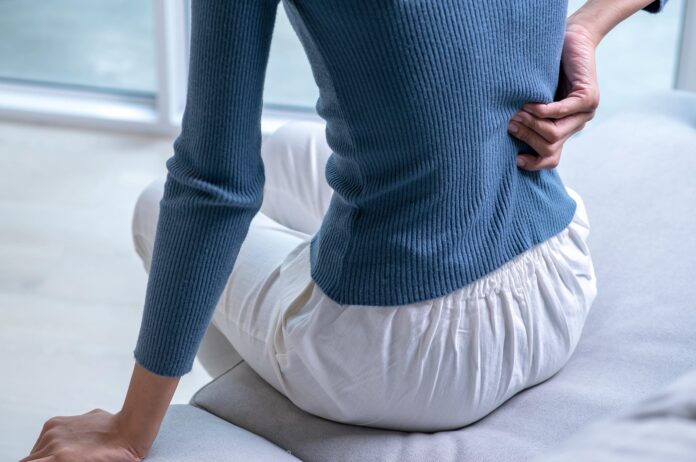Are you waking up in the morning with an achy back? How about stiff, painful knees after sitting for too long? Perhaps your shoulders seem to get cranky easily and don’t move the way they used to. On a scale of 1-10, how difficult is it to get that sports bra on these days? Are you also a woman in your late 30’s to early 60’s?
Joint pain can have many causes, including but not limited to an injury, osteoarthritis (aka “wear and tear”) or autoimmune disease such as rheumatoid arthritis or lupus. What you might not realize is that perimenopause is also a reason for joint pain. The aches and pain in your neck, shoulders, hands, knees, hips and feet could be related to the changes in your estrogen levels as you move through the stages of decreasing hormone levels.
In perimenopause, estrogen levels drop and/or fluctuate depending on the stage in the process. There are estrogen receptors on all of the joints, and they are protective to the joints and bones, so it’s believed that both the decline and fluctuation in estrogen levels can lead to inflammation and swelling in the joints. We can’t stop perimenopause, but there are some things that can help.
• Keep moving! This can be difficult since when something hurts, the tendency is to do less, but joints that aren’t moving will become more stiff and painful. Start with keeping it gentle and/or low impact, such as walking, stretching, yoga and pilates. It could be as simple as sitting on a rebounder and bouncing!
• Stress management. Chronic stress leads to chronically elevated cortisol levels, which in turn equals increased inflammation. Reducing stress can be easier said than done, but start with what you can control. Make a point of taking 10-15 minutes times a day that are just for you- go for a walk, do a little meditation, read a book, chat with a friend.
• Pay attention to your food choices. Food can either be anti-inflammatory or inflammatory, depending on your choices. Start with reducing processed foods and sugar then work on increasing veggies, protein, healthy fats and water intake. Not only will you experience less pain, but you will likely also have a lot more energy!
• Anti-inflammatory herbs. It can be tempting to take ibuprofen or acetaminophen regularly to help with the pain, but while these medications can be helpful short term, they are also hard on the liver and the stomach, so having other options that don’t have adverse side effects is important. Some of my favorite anti-inflammatory herbs are curcumin, boswellia and ginger. Dosing and absorption are important considerations, so talk to a doctor knowledgeable about these herbs.
• PEA. This nutritional supplement is an endocannabinoid-like compound researched extensively for its anti-inflammatory and analgesic properties as well as other positive impacts it can have on the immune system, brain and gut. Its ability to help decrease pain and inflammation AND its low side effect profile make it a good option to consider for joint pain.
• Acupuncture. An ancient but effective treatment that can help decrease joint pain and improve stress levels!
A few important reminders- if you’re experiencing pain, discuss it with your doctor AND never start a new supplement, herb or medication without checking with them first. And while perimenopause and menopause are inevitable for all women, suffering from joint pain shouldn’t be!

























